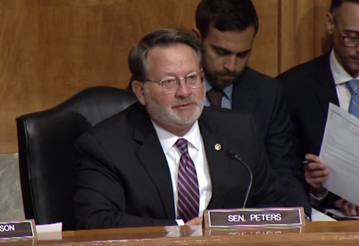VIDEO: Peters Delivers Remarks on Combatting Domestic Terrorism and White Supremacist Violence
Peters: “We have not adequately grappled with white supremacist violence. Over the last decade it has become, by far, the deadliest form of domestic terrorism we face.”
WASHINGTON, DC – U.S. Senator Gary Peters (MI), Ranking Member of the Senate Homeland Security and Governmental Affairs Committee, helped convene the committee’s first ever hearing on domestic terrorism with a focus on countering white supremacist violence. At the hearing, Peters discussed how hateful ideologies like white supremacy have motivated deadly domestic terror attacks in recent years, and how the federal government must address this evolving threat to protect our national security and keep Michiganders and Americans safe.
Below is video and the text of Peters’ opening remarks as prepared for delivery:

“I am grateful to the Chairman that today, for the first time, this Committee is holding a hearing that gives us the opportunity to focus on white supremacist violence, a form of terror that is older than the nation itself.
“Since September 11, 2001, this Committee has held more than 50 hearings focused on terrorism. We have been, and we remain, rightfully focused on the threat posed by foreign terrorists and their homegrown imitators.
“Unfortunately, over that time, we have not adequately grappled with white supremacist violence. Over the last decade it has become, by far, the deadliest form of domestic terrorism we face.
“Its trademark racist rhetoric and dehumanizing language has embedded itself in our public discourse. And it is amplified around the world at the speed of light via social media platforms.
“In Charleston, the shooter who took the lives of nine African American churchgoers, while their heads were bowed in prayer, had self-radicalized online and regularly espoused racist rhetoric on his own website.
“The terrorist who ran down a crowd of peaceful protesters in Charlottesville drove hundreds of miles to join in the largest and most violent gathering of white supremacists in decades.
“The extremist who murdered eleven worshippers at the Tree of Life synagogue, the deadliest attack on the Jewish community in our nation’s history, regularly posted anti-immigrant and anti-Semitic conspiracy theories on white supremacist social platforms.
“A white supremacist in Southern California was inspired by the horrific Christchurch mosque attack, which was livestreamed and shared virally, and the Tree of Life massacre. He failed in his attempt to burn down a mosque but succeeded in shooting up a synagogue, killing one and injuring three, including the rabbi.
“The perpetrator in El Paso, who killed 22 people and wounded dozens more in the deadliest attack on the Latino community in our nation’s history, also cited the Christchurch attack and spewed familiar hateful rhetoric about a “Hispanic invasion” in a manifesto he posted online.
“White supremacy is a homeland security threat. That’s why Chairman Johnson and I have launched one of the first bipartisan efforts in Congress to address it. In May, we asked the Department of Homeland Security, the FBI, and the Department of Justice: “How many Americans have been killed or injured in domestic terrorist attacks since 2009, broken out by ideology.
“It took DHS two months to tell us that they didn’t know. After four months, the FBI and the Justice Department have failed to respond. Last week, in response to our pressure, DHS finally released a policy paper acknowledging the growing white supremacist threat.
“But we cannot effectively address a threat that we cannot measure. We need data to track and assess this rapidly evolving threat so that we can ensure our resources are aligned with the threats we face.
“Today, we will have a discussion about the path forward. We need to confront the scourge of domestic terrorism, and any solutions we consider must be based on facts and sound data.
“But even the most well-intentioned policies can have harmful unintended consequences. Looking back on our response to September 11th, I am acutely aware of how our policies were wrongfully used to cast suspicion on entire communities, primarily Arab Americans and Muslim Americans – including vibrant, patriotic communities that I represent in Michigan. As we work to tackle the threat posed by domestic terrorism and white supremacist violence, we cannot repeat the mistakes of the past.
“I hope that today’s hearing will be an important step toward meaningfully addressing the growing threat of white supremacist violence. We must be clear-eyed about the challenges we face, focus our resources in response to accurate threat data, and make sure that all Americans feel safe where they live, work, and pray.”
###